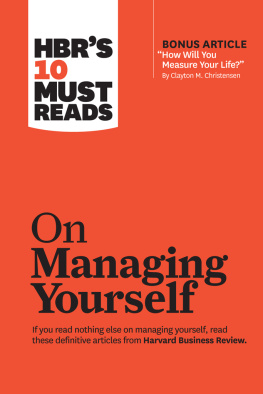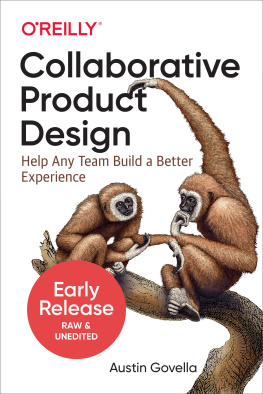HBR Guide to
Collaborative Teams
Harvard Business Review Guides
Arm yourself with the advice you need to succeed on the job, from the most trusted brand in business. Packed with how-to essentials from leading experts, the HBR Guides provide smart answers to your most pressing work challenges.
The titles include:
HBR Guide for Women at Work
HBR Guide to Beating Burnout
HBR Guide to Being More Productive
HBR Guide to Better Business Writing
HBR Guide to Building Your Business Case
HBR Guide to Buying a Small Business
HBR Guide to Changing Your Career
HBR Guide to Coaching Employees
HBR Guide to Collaborative Teams
HBR Guide to Data Analytics Basics for Managers
HBR Guide to Dealing with Conflict
HBR Guide to Delivering Effective Feedback
HBR Guide to Emotional Intelligence
HBR Guide to Finance Basics for Managers
HBR Guide to Getting the Mentoring You Need
HBR Guide to Getting the Right Job
HBR Guide to Getting the Right Work Done
HBR Guide to Leading Teams
HBR Guide to Making Better Decisions
HBR Guide to Making Every Meeting Matter
HBR Guide to Managing Strategic Initiatives
HBR Guide to Managing Stress at Work
HBR Guide to Managing Up and Across
HBR Guide to Motivating People
HBR Guide to Negotiating
HBR Guide to Networking
HBR Guide to Office Politics
HBR Guide to Performance Management
HBR Guide to Persuasive Presentations
HBR Guide to Project Management
HBR Guide to Remote Work
HBR Guide to Setting Your Strategy
HBR Guide to Thinking Strategically
HBR Guide to Work-Life Balance
HBR Guide to Your Professional Growth
HBR Guide to
Collaborative Teams
HARVARD BUSINESS REVIEW PRESS
Boston, Massachusetts
HBR Press Quantity Sales Discounts
Harvard Business Review Press titles are available at significant quantity discounts when purchased in bulk for client gifts, sales promotions, and premiums. Special editions, including books with corporate logos, customized covers, and letters from the company or CEO printed in the front matter, as well as excerpts of existing books, can also be created in large quantities for special needs.
For details and discount information for both print and ebook formats, contact .
Copyright 2021 Harvard Business School Publishing Corporation
All rights reserved
Printed in the United States of America
10 9 8 7 6 5 4 3 2 1
No part of this publication may be reproduced, stored in or introduced into a retrieval system, or transmitted, in any form, or by any means (electronic, mechanical, photocopying, recording, or otherwise), without the prior permission of the publisher. Requests for permission should be directed to , or mailed to Permissions, Harvard Business School Publishing, 60 Harvard Way, Boston, Massachusetts 02163.
The web addresses referenced in this book were live and correct at the time of the books publication but may be subject to change.
Cataloging-in-Publication data is forthcoming.
ISBN: 978-1-64782-089-3
eISBN: 978-1-64782-090-9
The paper used in this publication meets the requirements of the American National Standard for Permanence of Paper for Publications and Documents in Libraries and Archives Z39.48-1992.
What Youll Learn
More and more, individuals in organizations are being asked to work together to accomplish important projects and meet key objectives. But effective collaboration is no easy task. From navigating competing priorities to simply finding time for team members to meet, any number of obstacles can slow down productivity or even lead to failure. Getting all members of a cross-functional team on the same page, and working toward the same goal, is far easier said than done.
Collaboration is a skill that many companies expect of their employees but rarely train them in. Building a diverse team, ensuring everyone can work together smoothly, setting norms around communication and decision making, and proactively resolving conflicts all tend to be left to team leaderswho may not even have formal authority over the people theyre leading. Its no wonder collaboration can feel like an uphill struggle. But it doesnt have to.
Whether youre leading a collaborative team for the first time or youve worked on cross-functional initiatives for years, this guide will help you manage challenges and solve problems so your projects reach successful outcomes. Youll learn how to:
- Find the right mix of skills and personalities for your project
- Lead and motivate people you dont have authority over
- Ensure all team members understand their roles and responsibilities
- Manage a high-powered group of A players
- Create the psychological safety people need to do their best work
- Make decisions as a groupeven when team members disagree
- Solve turf wars and interpersonal conflicts
- Collaborate effectively across locations and zones
- Work productively with colleagues you dont get along with
- Help team members execute on goals
- Set the conditions for agile teamwork
Contents
To work together well, we need to embrace our differences.
BY JEFF WEISS
To lead people who dont report to you, try lateral leadership.
BY LAUREN KELLER JOHNSON
You need three specific capabilities.
BY JENNIFER PORTER
Figure out where you add the most value.
BY ROB CROSS, SCOTT TAYLOR, AND DEB ZEHNER
Heres how to get the right mix.
BY DAVE WINSBOROUGH AND TOMAS CHAMORRO-PREMUZIC
Think about what you can offer them in return.
BY DORIE CLARK
Theres a right way and a wrong way to organize them.
BY MICHAEL MANKINS, ALAN BIRD, AND JAMES ROOT
Nurturing internal networks can lead to better outcomes.
BY ALIA CROCKER, ROB CROSS, AND HEIDI K. GARDNER
Heres how to create it.
BY LAURA DELIZONNA
Fuzzy responsibilities are bad for collaboration.
BY TAMMY ERICKSON
Every company has many cultures.
BY ROGER SCHWARZ
If-then planning is the key.
BY HEIDI GRANT
Each project stage needs the right amount of teamwork.
BY ELAINE D. PULAKOS AND ROBERT B. (ROB) KAISER
The most intractable people take up the most time and energy.
BY NIGEL NICHOLSON
Six tools for training people to work together better.
BY FRANCESCA GINO
Keep the group small and diverse.
BY TORBEN EMMERLING AND DUNCAN ROODERS
Before you start, agree on how it will end.
BY BOB FRISCH AND CARY GREENE
Be strategic about meetings and communication.
BY ELIZABETH GRACE SAUNDERS
Constructive conflict is good for creativity.
BY LIANE DAVEY
Four questions to start getting on the same page.
BY RON CARUCCI
Check your mindset, and focus on the larger goal.
BY AMY GALLO
Be a mediator, not a boss.
BY JEANNE BRETT AND STEPHEN B. GOLDBERG
You can still have a productive relationship.
BY MARK D. NEVINS
INTRODUCTION
Why Collaboration Is So Hard













